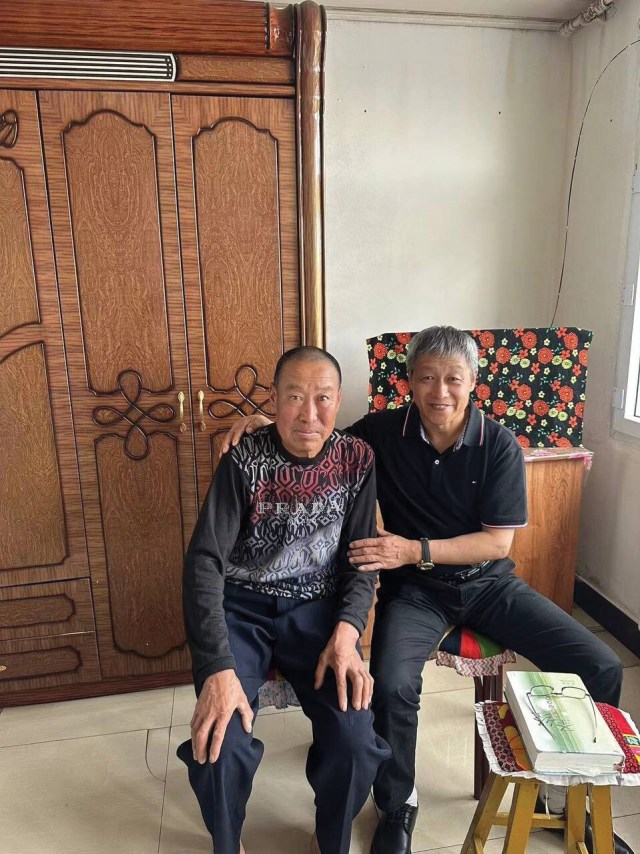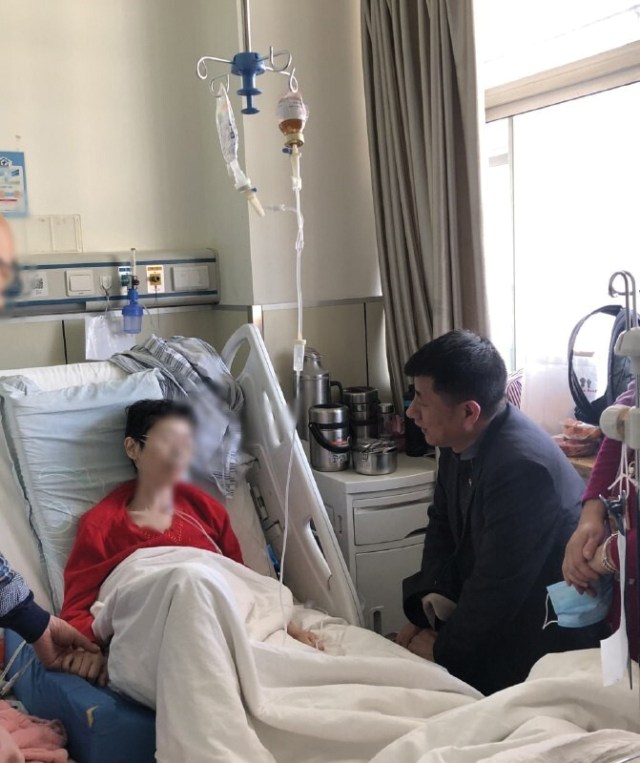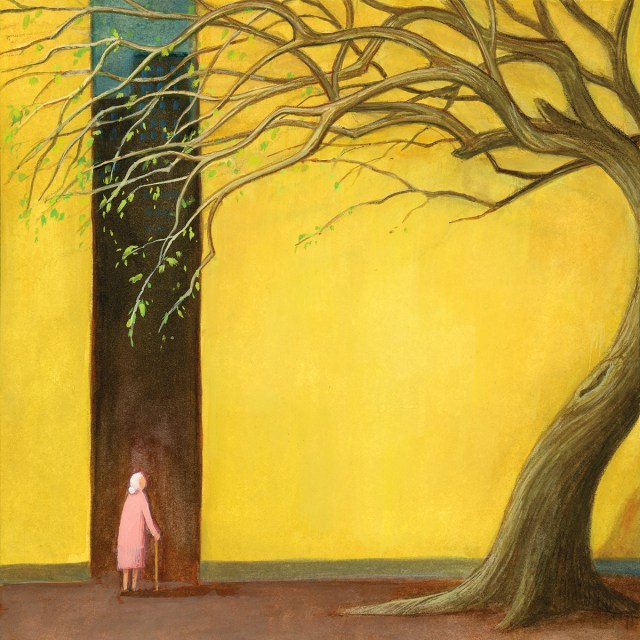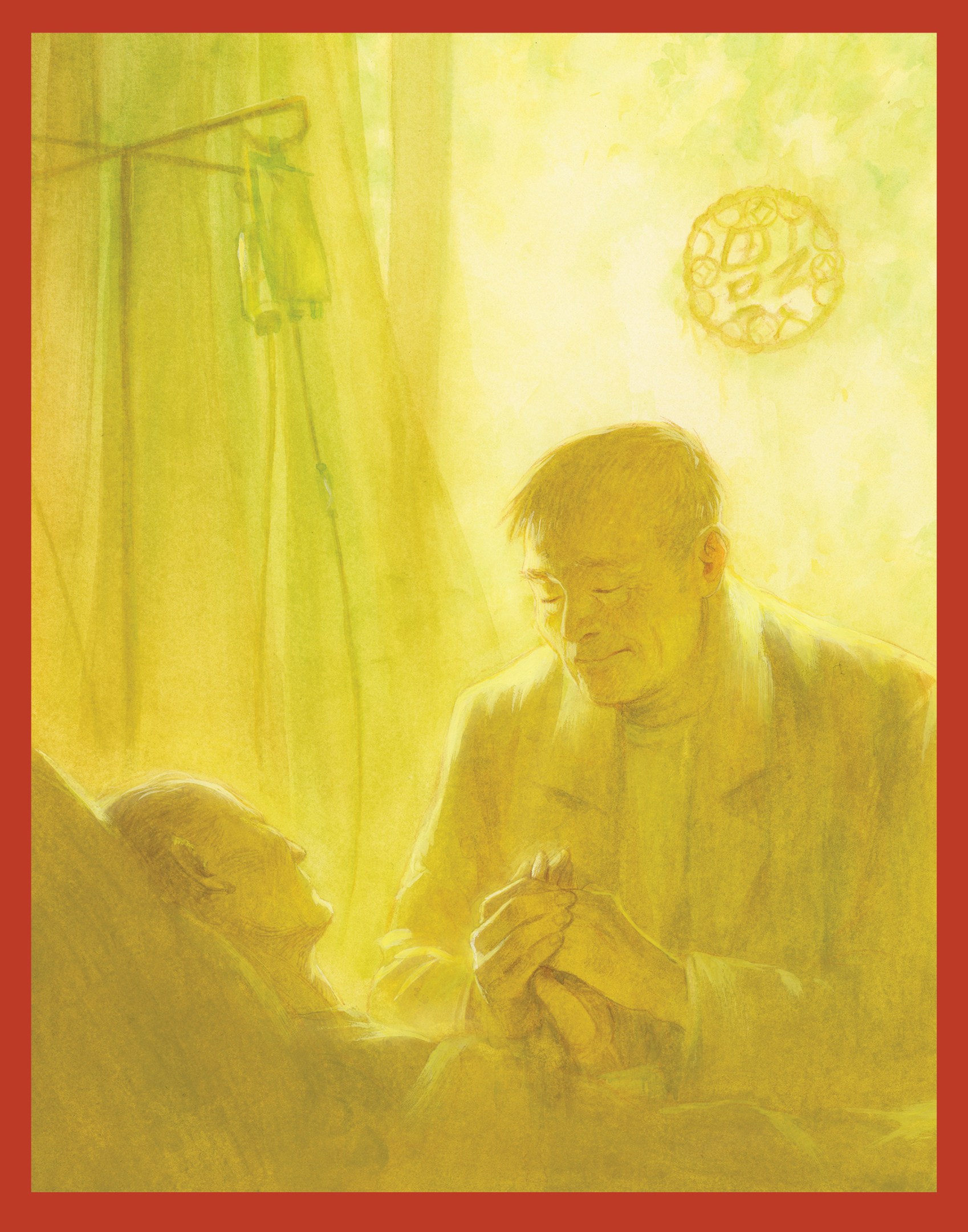Part I
When a 70-year-old man infected with anthrax bacteria asked church members to visit him, Xi Feng Zhao joined, even though for the past week he’d suffered his own bout of nerve pain with sleepless nights. He and the other church caregivers arrived to find a man wracked with pain. They had to cover their noses. Some vomited because of the foul odor.
Zhao, known to many as Brother Faithful, didn’t hesitate to go to the patient’s bed. He was overcome to realize that the pain he had suffered for the past seven days and nights was preparing him to care for the person in front of him.
The man with anthrax was the director of the anticorruption bureau in Harbin, an industrial city of nearly 10 million people in China’s northeast. He had a reputation for strict integrity and impartiality. He did not know how he contracted the disease but, after he fell ill, many Christian lay people and pastors visited him and urged him to come to faith in Christ. But when sin was mentioned, he could not admit he was a sinner, not someone like those he had caught in his work.
But the day Zhao visited, something broke. The director surrendered to God’s holiness and sovereignty.
The two men held hands and shared each other’s pain. Zhao started to sing hymns. The man cried. More surprising, he started to pray and to confess that he was a sinner needing God’s forgiveness. One half of his face, festering from infection, grew more distorted as he cried, yet the other half could not hide the joy of release. Zhao held tight his hand and prayed for him. Both men were filled with peace and joy, even as they shared the man’s highly contagious tears and saliva.
Within a week, the director was dead.
 Photos courtesy of Brother Faithful and Pastor Li
Photos courtesy of Brother Faithful and Pastor LiIn China, end-of-life care is still developing, and spiritual care is often left out. Nurses and doctors who see the hospital as a field of physical healing may fail to see that a patient’s spiritual needs cannot be met by healing the body.
Experts say China’s once-surging population is aging and shrinking. By mid-century it will have up to 200 million fewer people, while the median age will climb from 38 years old to 50. China also has the world’s highest number of patients with terminal cancer, with 6,000 deaths per day from cancer, according to the 2020 World Cancer Report.
At the same time, the current trend of one-man authoritarian rule makes reforms to health care systems challenging and elder care a low priority for most officials. Those hardships are acute in China’s rural areas, where the elderly receive pensions that are just a fraction of what the elderly in urban areas receive.
Enter Christian groups like Zhao’s and the Golden Apple Life Care Team, which began in 2017 as a ministry to China’s rapidly aging population and to the critically ill.
The deepest problem triggered by illness, according to Golden Apple founder Pastor Li, is the loss of the value and meaning of life. “These patients have psychological anxiety and despair in addition to physical pain. Only when a person has a correct understanding of life can he see the value and meaning of life and thus complete his farewell on earth calmly and peacefully. Only when he is filled with love can he have hope instead of despair.”
As the founder of the Golden Apple Life Care Team, Li observed through his years of exploration and practice that for a seriously ill patient, medical care must be combined with spiritual care for healing to happen. The team’s track record has drawn attention from wider clinical circles.
In 2018, Liu Jin, a Beijing-based psychological counselor with a PhD in sociology, grew frustrated as she visited critically ill patients. Often she found herself wrapped up in their despair, dragged with them to the edge of death’s abyss. She joined her teammates on patient visits in silence, only to return to her office and cry. In the midst of this helplessness and pain, she began to understand that God had brought her into critical care ministry not to use her talents and abilities, but to fulfill her own life.
Liu says she could not face the truth of death if God had not led her to a wide place and given her the power of the Holy Spirit. She also learned from Li and his Golden Apple care team about the simple gift of care.
“Are you all right?” Li would gently ask, drawing near to a patient. And the patients’ faces, which were gray and stiff, blossomed into expression, some eyes red with tears. To them, Li is a messenger of love.
With such examples, Liu said, “God has given me a true knowledge of life and death through serving the flesh that is weak and broken . … My life grows in patience and tolerance, and I see more and more the meaning and value of service itself.”
Zhao, for all his decades of critical care ministry, has never received formal theological training or a day’s salary from the work. Though he dropped out of elementary school, he seized the opportunities created by China’s economic reforms and opening in the 1990s to become a wealthy businessman. But he squandered his money with eating, drinking, gambling, and chasing women, he says. He was a “society big brother” with bodyguards in front and behind him during the day—but at night he couldn’t sleep because of the emptiness in his heart.
During those years his Christian mother and sister prayed for him. He found a church where a man greeted him with, “Brother, who are you looking for?” Brother Faithful was immediately in tears, discovering he believed in the gospel. That day he went from being a “big brother” in society to a brother in Christ.
He began reading the Bible with thirst and hunger every day. But the turn of his life was greeted by cursing from his wife and abandonment by his friends. That experience helps him, he says, to stand firm in care ministry when doctors and nurses want to throw him out and patients are indifferent.
“Where the gospel is to break through, there are bound to be forces of darkness that stand in the way. God allows persecution to come in order that our faith, having been tried, may truly persist,” Faithful says.
Scolded on a first visit to see a patient, he has learned to come back the next day with a meal he has prepared to share.
 Photos courtesy of Brother Faithful and Pastor Li
Photos courtesy of Brother Faithful and Pastor LiOne patient he met this way was Xie Zishan, an executive at a large business group in one of China’s three northeastern provinces. Hospitalized with leukemia and suffering from high fever, Xie maintained a violent temperament. Over and over, he forced doctors, nurses, and Zhao out of the ward.
One day, Xie had a high fever that wouldn’t go away. His joints hurt and he was bleeding in many places. His wife said to Zhao, “Pray for him, and if his fever goes down, our whole family will believe in your God.”
Zhao replied, “I prayed and asked God to change his life, and whether the fever goes down or not, God is true and righteous.”
Xie’s fever did go down, and he trusted Jesus then and there.
Zhao never tells patients they will be healed if they believe in the Lord, but he helps them through prayer to see that they are sinners needing the Savior’s forgiveness and cleansing. It helps that he, along with others in his church, cook and serve meals for the sick.
Through Golden Apple’s ministry, views on life and death are being reshaped. Confucius said, “If you don’t know life, how can you know death?” Yet facing death directly is not a strength of Chinese culture today, according to Li.
Traditionally, Confucianism and Taoism have seen death as a natural part of life, like the change of seasons alternating with the gathering and dissipation of qi (the rhythmic energy that constitutes all things). Morality and meditation pave the way to an afterlife.
But modern Chinese are greatly influenced by atheism and materialism. For most people, death is not a familiar, controlled, and necessary process of life, but a mysterious and terrifying black hole that destroys all meaning and hope.
“We used to think of the body as the whole of life,” says Li, “so when the body is coming to an end, we are scared. But if you know that the body is just a vehicle, you can understand that though outwardly we are wasting away, yet inwardly we are being renewed day by day. When your inside is satisfied with love, you will find that love transcends time and space, and perfect love drives out fear.”
Li’s Golden Apple care team, working with Liu Jin and caregivers like Zhao, has developed a curriculum around life and death as part of its innovative approach to elder care that has helped thousands in their final days. The course, “Life Care for the Critically Ill,” has become popular in wider Chinese circles. The team is helping churches in Beijing, Shanghai, Guangdong, and Shandong to establish their own hospital ministry teams.
As China has tightened religious restrictions, some large local churches have been returning to more “underground” methods, like meeting in small, in-home groups. As many house churches begin to look for new ways to reach out to their communities, China’s elderly and critically ill populations are the kind of groups that are easy to overlook but in urgent need of the gospel message.
Li and Zhao see the church as precisely the right group to help China’s aging population see that hope in this life is anchored in hope for the next.
“After understanding what life is, when going through their own difficulties, they will gradually realize that things are not so miserable after the fear is removed. It is then that they can make the right judgment and choice, face death with no fear, and live life with no regret,” Li said.
 Illustration by Xinyue Chen
Illustration by Xinyue ChenPart II
“Auntie” Niu, at over 70 years old, was reluctant to socialize when she moved in with her son in Beijing several years ago. Instead, she made a hobby of buying health care products, taking all kinds of fraudulent health care telemarketing calls. When her son told her to avoid such schemes, she grew angry and sullen.
Niu was widowed at an early age. She worked hard to bring up a son and a daughter, but her daughter committed suicide in her 20s. Her son, too, was depressed. Had he not met the Lord, Niu says, both her children might be dead. Niu was known as a strong person, but she grew to feel that fate had abandoned her.
Her son thought it might help Auntie Niu to participate in something he’d heard about called the Life Storybook program, where she could work with a dozen other seniors to do crafts and games and participate in sessions where she would craft stories from her own experiences. In these storytelling workshops she could sort out her life, from birth to old age, helping her understand the struggles and recapture the good memories.
The program is an innovation of the Golden Apple Life Care Team, a ministry that aims to reach older Chinese people with physical and spiritual care.
Niu gave the Life Storybook group a try. But she wanted to quit after only a few lessons. For her, family memories were full of pain and unpleasantness.
Her perspective gradually shifted, however, with the guidance of mentors and in the company of other group members. Niu recalled that as a rural midwife, she had saved the lives of many unborn babies and newborns in the countryside. Time after time, her perseverance had brought joy to mothers after the pain of difficult deliveries. Niu realized that others in her group—both the elderly and the younger participants who accompanied them—were attentive to her stories. Soon she grew confident enough to share more. Her memories of saving babies became a comfort in a life that seemed to have lost purpose.
At the end of 12 “storybook sessions,” Niu became more actively involved in the program. She volunteered to promote it. She participated a second time. She testified in the class that “looking back at my life again, I don’t think I have any regrets anymore.”
“There are many Christian teams that provide what the elderly need, but we want to help them enter the depths of their own souls and truly know life, through our companionship and guided by our professional skills,” said Liu Jin, a Christian psychologist and counselor in Beijing who helped to develop the curriculum.
“The renewal of life is the renewal in the soul, and we can renew it every day if we want to. The same is true of the elderly, and the power of their life renewal will amaze people,” Liu said.
Combating depression, which is pervasive in China’s senior community, is one of the program’s major goals. Depression in the elderly can lead to rapid physical decline, pseudo-dementia, and even self-harm and suicidal thoughts.
“The elderly, like other psychologically vulnerable groups, suffer from a deep sense of loneliness. But behind the loneliness are two deeper issues. One is the fear of death. The other is the loss of a sense of worth that comes from the loss of control,” Liu said. Physical incapacity exacerbates feelings of loss, which can lead to the collapse of values.
“Older people are more likely to avoid relationships than younger people and become trapped in self-imposed isolation,” the psychologist said.
More and more churches and Christian teams across China have become involved in senior care ministries in recent years, reaching out to help their communities at a time when the church finds itself under more state scrutiny. According to Golden Apple, the Life Storybook program has also found its way into non-Christian social care institutions, where seniors from different backgrounds of various religions participate in the courses.
The elderly in China, one Chinese pastor told CT, “have an important place in missions.”
Eva Chou is a journalist living in Shanghai.

















